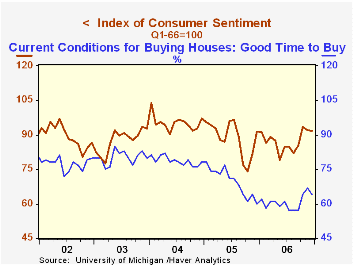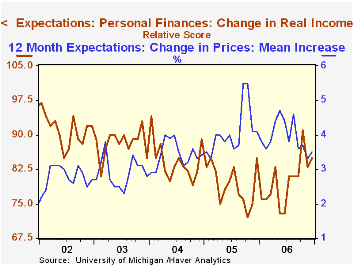 Global| Dec 22 2006
Global| Dec 22 2006U.S. Consumer Sentiment Recovered Some
by:Tom Moeller
|in:Economy in Brief
Summary
The University of Michigan's full month reading of consumer sentiment in December slipped 0.4% to 91.7, but that was less than the 2.1% drop in the preliminary report. Consensus expectations for a reading of 90.2. During the last ten [...]

The University of Michigan's full month reading of consumer sentiment in December slipped 0.4% to 91.7, but that was less than the 2.1% drop in the preliminary report. Consensus expectations for a reading of 90.2.
During the last ten years there has been a 76% correlation between the level of consumer sentiment and the y/y change in real consumer spending and during those ten years sentiment has a 68% correlation with the change in nonfarm payrolls.
Consumer expectations for the economy improved from the preliminary read but they still fell 2.4% for the second consecutive monthly decline. Business conditions during the next twelve months fell 6.3% (+1.0% y/y) and long term expected business cosnditions were unchanged for the second month (+10.2% y/y). Expected personal finances slipped for the second consecutive month (-3.9% y/y).
The reading of current economic conditions actually improved 2.0%, about the same as in the preliminary report. Perceived buying conditions for large household goods rose 3.2% (-1.8% y/y) but perceptions of current personal finances were unchanged (0.0s% y/y).
The reading of whether it's a good time to buy house fell m/m but remained up from the lows this past Summer.
Expected inflation during the next year increased to 3.5% but for the next five years expected inflation fell to 3.4%. Since 1980 there has been an inverse 63% correlation between the level of sentiment and expected inflation during the next year.
Consumers' opinion about gov't economic policy slipped m/m to just 89 versus a midmonth read of 86.
The University of Michigan survey is not seasonally adjusted.The mid-month survey is based on telephone interviews with 250 households nationwide on personal finances and business and buying conditions. The survey is expanded to a total of 500 interviews at month end.
| University of Michigan | December (Final) | December (Prelim. | November | Y/Y | 2006 | 2005 | 2004 |
|---|---|---|---|---|---|---|---|
| Consumer Sentiment | 91.7 | 90.2 | 92.1 | 0.2% | 87.2 | 88.6 | 95.2 |
| Current Conditions | 108.1 | 108.2 | 106.0 | -0.9% | 105.1 | 105.9 | 105.6 |
| Expectations | 81.2 | 78.6 | 83.2 | 1.2% | 75.7 | 77.4 | 88.5 |
Tom Moeller
AuthorMore in Author Profile »Prior to joining Haver Analytics in 2000, Mr. Moeller worked as the Economist at Chancellor Capital Management from 1985 to 1999. There, he developed comprehensive economic forecasts and interpreted economic data for equity and fixed income portfolio managers. Also at Chancellor, Mr. Moeller worked as an equity analyst and was responsible for researching and rating companies in the economically sensitive automobile and housing industries for investment in Chancellor’s equity portfolio. Prior to joining Chancellor, Mr. Moeller was an Economist at Citibank from 1979 to 1984. He also analyzed pricing behavior in the metals industry for the Council on Wage and Price Stability in Washington, D.C. In 1999, Mr. Moeller received the award for most accurate forecast from the Forecasters' Club of New York. From 1990 to 1992 he was President of the New York Association for Business Economists. Mr. Moeller earned an M.B.A. in Finance from Fordham University, where he graduated in 1987. He holds a Bachelor of Arts in Economics from George Washington University.
More Economy in Brief
 Global| Feb 05 2026
Global| Feb 05 2026Charts of the Week: Balanced Policy, Resilient Data and AI Narratives
by:Andrew Cates






